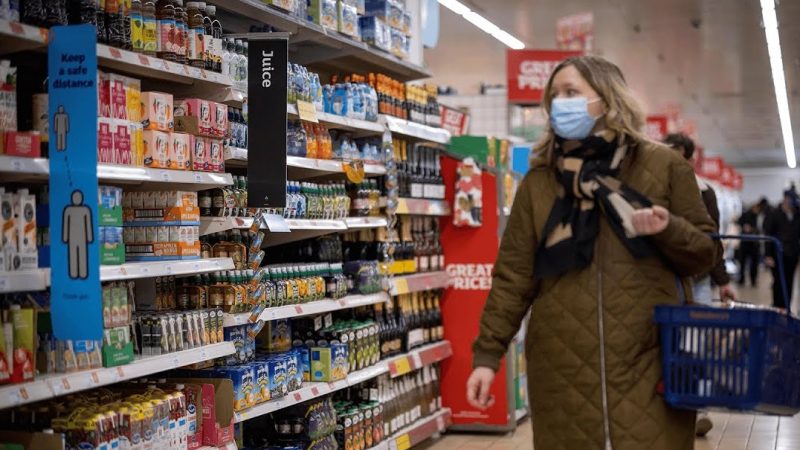The annual rate of inflation has hit 9%. Average wages during the first three months of the year increased by just 4.2%.

Prem Sikka is an Emeritus Professor of Accounting at the University of Essex and the University of Sheffield, a Labour member of the House of Lords, and Contributing Editor at Left Foot Forward.
Britain’s cost-of-living crisis is worsening and it is mostly manufactured by government policies which have squeezed household incomes and escalated increase in the price of essentials.
The annual rate of inflation has hit 9%. Average wages during the first three months of the year increased by just 4.2%. Faced with high energy, food and transport costs, people are reducing discretionary expenditure and in March the economy shrank by 0.1%. An economic recession looms.
The government blames the Covid-pandemic and the Ukraine war for poor economic performance. Other countries have been hit by the same too but the UK’s plight is much worse. The UK’s rate of inflation is the highest amongst the G7 countries. The USA rate of inflation is 8.3%; Germany, 7.4%; Canada, 6.7%; Italy, 6%, France 4.8% and Japan’s inflation rate for April 2022 is expected to hit 2.1%.
The International Monetary Fund (IMF) states that in 2023 the UK economy may grow by just 1.2%, the lowest in advanced developed economies. The EU member states’ economy is expected to grow by 2.5%. So, reasons for the crisis are specific to the UK.
The government has shrunk people’s disposable income. Since the 1970s, there has been a relentless attack on trade unions and workers’ rights. Workers’ share of the gross domestic product (GDP), in the form of wages and salaries, has declined from 65.1% in 1976 to barely 50% by the end of March 2022.
Disposable income has been eroded by never-ending austerity introduced by the government since 2010. Pay rises for public workers continue to be well below the rate of inflation. NHS staff pay increased by just 3%; firefighters by 3% and 1.5% for local government workers. In April, the state pension increased by 3.1%, effectively a cut in real terms. The maximum UK state pension of £185.15 per week for 2022/2023 is around 50% of the minimum wage and only 4 out of 10 retirees receive this. It is one of the lowest, as a percentage of average earrings, in the industrialised world even though the National Insurance Fund Account has a surplus of £42.5bn.
Regressive tax policies have further depleted people’s purchasing power. The poorest 10% of households pay 47.6% of their income in direct and indirect taxes, compared to 33.5% by the richest 10%. In April 2023, the government imposed another £7.5bn worth of tax increases, which by 2025/26, will remove £40bn from household budgets.
Brexit remains a major factor in creating shortages and pushing-up business costs. The highest rate of inflation for 40 years caused by corporate profiteering and poor government policies. Around 75% of the UK inflation is attributable to domestic energy prices which have increased by 54% this year and more is on the way. There is virtually no increase in the cost of producing gas or oil. It is the selling price which has increased and has inflated the profits of corporations controlling the market. For the first three months of the year, BP made profit of $6.2bn (£4.9bn) compared to $2.6bn in the previous year. Shell reported quarterly profit of $9.1bn (£7.3bn) for the first quarter, compared to $3.2bn in the previous year.
There is a glut of natural gas and the wholesale price has declined by 80%, but there is no respite for people. One reason is that the UK lacks storage facilities and can’t take advantage of price falls. To secure supplies, energy companies entered into future contracts and they did not anticipate the price falls. So Brits are paying higher prices because of those contracts.
We are suffering from the privatisation follies. In 1986, British Gas was privatised. In 2017, Centrica (owner of British Gas) closed its Rough storage facility, 70% of the UK gas storage capacity, as the government refused to subsidise it. The government did not force the company to prioritise national interest.
Profiteering isn’t just confined to oil, gas and energy sectors. In the face of weak regulation it is all too prevalent. Supermarkets, banks and others are ripping off people.
Faced with squeezed incomes and escalating costs, Brits are skipping meals and the elderly seek shelter in public libraries and endless bus trips, just to stay warm. The Chancellor splashed around £13,000 a year on heating his swimming pool, whilst 42% of the adults survive on less than that.
The government can help people by increasing wages, pension and benefits, at least in line with inflation. It can curb corporate profiteering by imposing price controls and removing excessive profits through windfall taxes. It can bring essential economic sectors into public ownership and eliminate profiteering altogether.
It can cap energy prices and remove VAT from domestic heating. It can embrace progressive taxation policies to free the poorest from oppressive levels of taxes. It can eliminate tax perks of the rich; for example by ensuring that unearned income is taxed at the same rates as earned income. Applying this to capital gains alone, would generate additional £25bn a year.
The government has deliberately chosen to let the people suffer and thereby increase social misery, which will increase possibilities of social unrest.
Left Foot Forward doesn't have the backing of big business or billionaires. We rely on the kind and generous support of ordinary people like you.
You can support hard-hitting journalism that holds the right to account, provides a forum for debate among progressives, and covers the stories the rest of the media ignore. Donate today.



